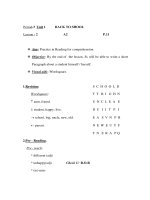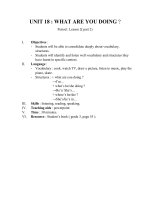English 8 review 3 unit 789 lesson 2 skills
Bạn đang xem bản rút gọn của tài liệu. Xem và tải ngay bản đầy đủ của tài liệu tại đây (450.33 KB, 13 trang )
What can you see?
Monday,
th
February 26
2018
Review 3:
Period 82-
I.
READING
1. Read the text and choose the correct answer A,
B, C, or D for each question.
HURRICANE KATRINA
New Orleans, in Louisiana, is known as the most unique city in the
United States with distinctive architecture, cross-cultural heritage
and annual music festivals. However, due to its location along the
Mississippi River with lakes on the other side, and nearly half of
the city below sea level, the city faces the danger of fl ooding. So,
a levee system and drainage canals were built to
protect the city.
Early in the morning of August 29, 2005, Hurricane Katrina, the
most destructive natural disaster in the history of New Orleans,
struck the city. The storm brought strong winds and heavy rains
for several days. As a result, water from the river and lakes rose,
breaking the levees and poured directly into the city. Soon 80
percent of the city was under the water. People scrambled to
rooftops for safety, desperate for food and drinking water. The
winds were so strong that even beds in Hyatt Hotel were seen fl
ying out of the hotel windows. The loss was tremendous. Most of
the major roads and bridges were destroyed, and houses
1. New Orleans is famous for ______.
A. its modern architecture
B. its crosscultural heritage
C. its Mississippi River
D. its location
2. Which statement is NOT correct about New
Orleans?
A. It lies between the Mississippi River and lakes.
B. One of its attractions is its annual music
festivals.
C. The city is surrounded by water.
D. Most of the city is below sea level.
3. Which one is NOT mentioned as being damaged
by Hurricane Katrina?
A. Distinctive architecture
B.
The levee system
C. Major roads
D.
I. READING
II. SPEAKING
2. Work in pairs. Choose one of the topics
and make a short conversation.
Topics
1. A place in English speaking countries you would
like to visit.
2. An English speaking country which has a close
relationship with Viet Nam.
3. A type of disaster which frequently attacks your
area.
4. A type of natural disaster which threatens areas
Example:
along
coast.
A:
What the
is the
most serious type of pollution in your area?
5.Visual
A human
activity which increases pollution
B:
pollution.
A: Can you give an example?
B: Sure. People stick advetisement on walls.
A: Can you do any thing to reduce it?
B: Not much. Once we tear off one advertisement, there will be
more of them.
A: Oh! That’s terrible!
I.
READING
II.
SPEAKING
III.
LISTENIN
G
3. Listen to Nguyen talking with his friend Phong, who has
just come back from a visit to Singapore and decide if the
sentences are true (T) or false (F).
1. Driverless cars already exist.
2. They look so cool!
3. A jet pack doesn’t take lots of space.
4. Then perhaps a teleporter is the best.
5. Solar energy will power everything!
6. Both the school and the family are responsible for
teaching children how to behave in society
T
F
I.
READING
II.
SPEAKING
III.
LISTENIN
IV.
G
WRITING
4. The school is organising FIGHT POLLUTION DAY to raise
students’ awareness of the dangers of pollution. Choose one
activity you would like your friend to participate in and write
to him/ her introducing it.
Activity
Tim Place
Job description
e
Communit 8.30
y
work
12.0
0
Poster
designing
In
neighbourhoo
ds of the
community
whol At school
e
library
day
Greenisati 8.00
on
12.0
0
In community
park and
along the
sides of
community
paths
Pick up trash
Clear ponds and streams
Sort trash for recycling
Preparation: take pictures of
polluted places in the
neighbourhood Design posters
warning people of the dangers of
pollution and call for action to
protect the environment.
Plant trees and flowers, water
them and set up fences to protect
them
IV. Homework
- Practice the dialogue, learn by heart vocabulary.
- Do the exercises in the work book B1.
- Prepare the new lesson: Unit :10 Lesson 2: A closer look 1









